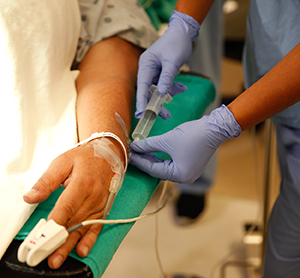Anesthesia: Monitored Anesthesia Care (MAC)

You’re going to have surgery. During surgery, you’ll be given medicine called anesthesia. This will keep you comfortable and pain-free. Your surgeon will use monitored anesthesia care (MAC). This sheet tells you more about this type of anesthesia.
What is monitored anesthesia care?
MAC keeps you very drowsy during surgery. You may be awake, but you likely won't remember much. And you won’t feel pain. With MAC, medicines are given through an IV (intravenous) line into a vein in your arm or hand. A local anesthetic will also be injected into the skin and muscle around the surgical site to numb it. The anesthesia provider monitors you during the procedure. They check your heart rate and rhythm, blood pressure, and blood oxygen level.
What to expect during your procedure
You'll likely have:
-
A pulse oximeter. This is a small device put on the end of your finger. This measures your blood oxygen level.
-
Electrocardiography leads (electrodes). These are sticky pads put on your chest. They attach to wires. These lead to a device that records your heart rate and rhythm.
-
Medicines given through an IV. These relax you and prevent pain. You may be awake or sleep lightly. If you have local anesthetic, it's injected directly into your skin.
-
A face mask. This is to give you oxygen. This may be done if needed.
Possible risks
MAC has some risks. These include:
Anesthesia safety
Tips for anesthesia safety include:
-
Follow all instructions for not eating or drinking before your procedure.
-
Tell your healthcare provider all prescription and over-the-counter medicines you take. Tell them if you use any anti-inflammatory medicine or blood thinners. This includes aspirin. Tell them if you take any vitamins, herbs, or other supplements.
-
Have an adult family member or friend drive you home after the procedure.
For the first 24 hours after your surgery:
-
Don't drive or use heavy equipment.
-
Don't make important decisions or sign documents.
-
Don't drink alcohol.
-
Have someone stay with you, if possible. They can watch for problems and help keep you safe.
© 2000-2025 The StayWell Company, LLC. All rights reserved. This information is not intended as a substitute for professional medical care. Always follow your healthcare professional's instructions.